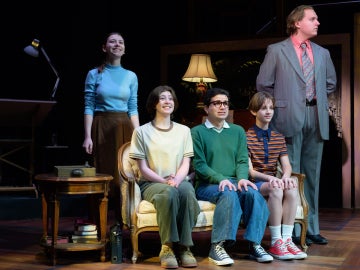B.J. Tindal ’16 Finds Early Success as Playwright
March 12, 2019
Amanda Nagy

B.J. Tindal is a 2016 graduate in theater and Africana studies.
Photo credit: Courtesy of B.J. Tindal
At Oberlin, B.J. Tindal had his hopes set on majoring in creative writing. When he didn’t get into the required intro-level course his first semester, the aspiring playwright enrolled instead in Professor and Chair of Theater and Professor of Africana Studies Caroline Jackson Smith’s African American Drama course.
Even though the department doesn’t have a playwriting concentration, the class influenced his decision to pursue theater and sparked the inspiration for a play that would help Tindal launch his career.
Fresh out of the graduate program in Writing for the Screen and Stage at Northwestern University, the 2016 graduate returned to campus in February for the opening of the Oberlin theater mainstage production of What We Look Like, a play he developed his first year at Oberlin. The play was chosen and directed by Jackson Smith, one of his closest mentors at Oberlin.
At the same time, Tindal was preparing for the production of Goodnight, Tyler, another play he wrote and directed at Oberlin, which won the top prize in the Alliance/Kandeda National Graduate Playwriting Competition. The show was presented February 16 through March 10 in the 200-seat Hertz Stage in Atlanta.
Following his mentor’s footsteps by working at the intersection of theater and Africana studies, Tindal has found early success by combining comedy and drama. What We Look Like is the story of a black family of five that moves from a predominantly black neighborhood to a white neighborhood in the suburbs. The youngest son creates an imaginary white family, which he illustrates in a family portrait that he draws in school. When he brings it home, the image “sends the mom into a spiral, because she’s worried that her son doesn’t want to look like her or his father or brother or sister,” Tindal says.
The play grapples with ideas of what a family is supposed to look like and how that can be damaging for some and beneficial for others, Tindal explains. “It’s about images of family and how race intersects with that and the pressures it puts on family units.”
What We Look Like premiered in fall 2014, Tindal’s junior year. It was presented again in spring 2015 during Commencement/Reunion Weekend.
Tindal says that two years of graduate school have taught him to not be afraid of rewriting, editing, and cutting. Consequently, the latest iteration of What We Look Like is significantly shorter.
“Basically, this is the first writing project I’ve done since grad school. It was cool to enter grad school having written this play, then graduating from Northwestern and approaching it again,” Tindal says. “A lot of the core remains the same, but there are some news things thematically. There are more things about home and community, and what it means when you’re outside of your community or moving to a new community and feeling like an outsider, and how that works for some people but doesn’t work for others, and how race plays into that. These are new layers.”
Goodnight, Tyler, another play he developed as an undergraduate, came as a surprise to his classmates and professors at Northwestern, when it won the 2018 Alliance/Kandeda graduate playwriting competition because they didn’t know the work even existed.
“I was teased a bit because no one at Northwestern had ever heard me read the script,” Tindal says.
The story centers on Tyler Evans, a young black man who is killed by police and haunts his best friend. True to form, Tindal injects a sense of humor into the hard subject of police violence and the deaths of black men.
“This play validates the black experience of loving and living,” he says. “People of color and people who are marginalized still find joy and love despite the bad things around them. I want to affirm the fact that black people are choosing to love freely, outside of violence. The way I work through my own identities is by joking a lot.”
When reflecting on how Oberlin prepared him for graduate school and his professional career, Tindal says the transition to Northwestern came easily because he was accustomed to a rigorous academic workload.
“I think I was super academically prepared,” he says. “My first quarter, a lot of other people were stressed out by the amount of work. I had to recalibrate what I considered work.”
A native of Philadelphia, Tindal is currently based in Chicago. He says the success of two professional productions within the first year of completing graduate school gives him some flexibility to work on existing projects. He’s also interested in teaching.
“I feel like I came to Oberlin at the right time. There were a lot of black artists who wanted to get things done. It gave me a lot of confidence.”
You may also like…
“Fun Home” Finds Itself at Oberlin
A theater department Winter Term project culminates in a thoughtful musical adaptation of Alison Bechdel '81’s graphic memoir, Fun Home
Vision Accomplished
How infrastructure, collaborative partnerships, and student involvement helped Oberlin achieve carbon neutrality
Just Jewels
Anna Bario ’03 and Page Neal ’04 build their jewelry brand around fair sourcing, sustainability, and heirloom-quality design.


